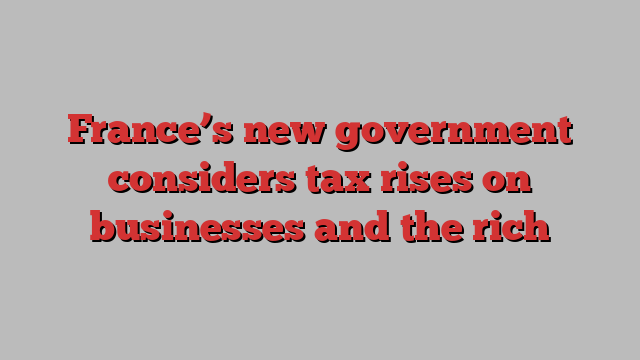
Unlock the Editor’s Digest for free
Roula Khalaf, Editor of the FT, selects her favourite stories in this weekly newsletter.
The new French government is studying options for tax increases on the wealthy and corporations in an effort to narrow widening deficits, while not undermining President Emmanuel Macron’s record of pro-business reforms.
Finance minister Antoine Armand, a little-known member of Macron’s centrist party before being named in Prime Minister Michel Barnier’s cabinet this month, said decisive action was needed to tackle “one of the worst deficits in our history” outside of exceptional crises such as the coronavirus pandemic.
“We will work to match the seriousness of the situation,” the 33-year-old told France Inter radio on Tuesday. “Targeted levies on the wealthiest households are being studied. Targeted levies on businesses . . . are also being considered.”
He continued: “People who have very significant assets, who sometimes do not pay a lot of taxes, perhaps they can contribute more.”
Armand and new budget minister Laurent Saint-Martin are sketching out potential tax rises to submit to Barnier in preparation for the 2025 budget due to be presented to parliament next month. The budget will be Barnier’s first major political test because opposition parties have threatened no-confidence motions against his fledgling government if they disagree with spending and tax choices.
Raising taxes would be a major break with Macron’s economic policy since he was first elected in 2017 of reducing taxes on business and households — which he has cast as key to boosting growth and higher investment.
But Macron’s successive governments have not paid as much attention to reining in spending, betting that stronger growth would naturally boost tax revenues. Although the approach has paid off in terms of lowering unemployment and coaxing companies to invest, a lack of fiscal discipline has led to wide deficits.
Brussels has placed France in what is known as an excessive deficit procedure and demanded that it provide a plan to reduce deficits in the coming years. Credit rating agencies have downgraded the country, while its cost of borrowing has risen.
The deficit is expected to hit at least 5.6 per cent of GDP in 2024, higher than the 5.1 per cent goal for the year, and surpassing the 5.5 per cent level from 2023.
French borrowing costs converged with those of Spain on Tuesday for the first time since the 2008 financial crisis, as investors worried about France’s ability to close its budget deficit.
Armand in his interview signalled his opposition to raising the tax burden on “working people and the middle class in a broad sense”. Yet his government has so far dodged questions about what it defines as middle class or rich, leaving it unclear who the new taxes would target.
He also stressed that any tax rises should not “dampen growth or job creation”, a sign that Barnier’s government would at least try to hew closely to Macron’s economic policies.
Goldman Sachs analysts pointed out that the tax burden in France was “already one of the highest among peers, leaving little room for further increases”.
“We look for the policy mix to skew towards reducing expenditure even though prime minister Barnier showed openness to relying on some revenue-raising measures,” they wrote in a note to clients.
Economists have suggested several potential cuts that would affect companies, such as trimming generous subsidies to employers who hire apprentices or those given to companies that do research and development.
The politically charged issue of whether France should reestablish a wealth tax, which was abolished by Macron and replaced with a tax on real estate holdings, has also cropped up again amid calls from leftwing parties to force the rich to contribute more to public coffers.
Barnier said over the weekend that an “exceptional contribution” might be asked of “the most affluent” and “very large multinational companies that can contribute to the national recovery effort”.
Business executives in France have begun to sense that the wind is turning towards tax rises. Patrick Martin, head of the Medef business lobby, told Le Parisien newspaper on Tuesday that he was “ready to discuss tax increases on companies”. However, he also put the government on notice that any rises should not come before a real effort to cut public spending.